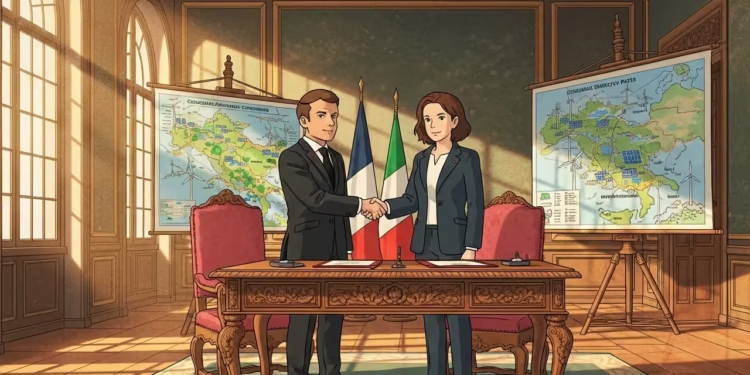France and Italy make history by signing an agreement on renewable energy for projects that span borders. BREAKING: June 28, 2025— France and Italy have inked a historic deal to work together on projects that use renewable energy. This is a huge step forward for European energy integration since it will make it easier for solar and wind projects to work together across borders. The arrangement expands on what the EU is already doing, such the European Investment Bank’s recent €243 million loan to Italy, France, and Germany for renewable energy projects.
“Supporting renewable energy is key to Europe’s energy independence,” stated Ambroise Fayolle, Vice President of the EIB.
He said that this Franco-Italian partnership is very vital for making Europe’s economy more environmentally friendly faster.
Context and Strategic Importance for the Region
This deal between two countries comes at a highly significant time for European energy strategy. Italy’s Transitional FER-X Decree took effect in February 2025. It gave a lot of reasons for installing renewable energy systems with a total capacity of 17.65 GW. The order sets up a 15-year subsidised tariff structure and grants new renewable energy plants up to 40% in capital subsidies. This shows that Italy is serious about using more renewable energy.
The recent €8 billion BNP Paribas-EIB deal to promote wind energy investments around the EU has also boosted France’s case. The purpose of this cooperation is to help the EU attain its target of getting at least 45% of its energy from renewable sources by 2030. It will do this by delivering 32 GW of the 117 GW of wind capacity it requires.
Because of where both countries are, it is conceivable to establish electricity infrastructure across borders. France has a lot of wind resources, while Italy has a lot of solar potential, for instance. These two countries might work together to develop a sustainable energy network that works well with the other one.
Multi-faceted Perspectives and Business Impact
Financial Management and Investment Movement
The Franco-Italian agreement makes the most of the significant financial assistance it obtains from European institutions. The EIB is investing €243 million to assist develop new wind farms on land in France, upgrade old wind farms in Italy and Germany, and create solar power facilities in southern Italy. By 2025, these buildings should be done. 97% of them are in places where people work together, which will be excellent for the local economy.
Big enterprises in the renewable energy field are already getting ready for this boom. Emeren Group produced money from roughly 1.3 GW of battery energy storage systems (BESS) projects and 199 MW of solar PV projects in 2024. The company does a lot of business in Italy, where it is working on more than 1,210 MW of BESS under development services agreements. There are 4,514 MW of solar projects and 3,071 MW of storage projects in the company’s European pipeline, all at varying stages of development.
Technology Integration and Grid Modernization
The deal talks about big difficulties with infrastructure that make it impossible to employ clean energy. Canadian Solar claims that by the middle of 2024, EU member states need to reform how they give out permits and by February 2026, they need to set up areas to speed up the usage of renewable energy. The agreement between France and Italy gives both countries a way to speed up these processes.
Industry executives say that integrating energy storage is very vital. More than 70% of new solar panels on homes in Germany and Italy are connected to batteries. Only 10% of new homes in the US include solar panels that are connected to batteries. This technological edge puts the Franco-Italian alliance in a good position to make the most of renewable energy by using advanced storage solutions.
Regulatory Compliance and Market Access
The pact addresses regulatory fragmentation that has made it impossible for renewable projects to move across borders in the past. The Eligible Areas Decree from June 2024 made it plain how to discover appropriate areas to put up renewable energy systems in Italy. But most areas of Italy still haven’t passed the laws that are needed to make it happen. This gives both sides a chance to work together to speed up the process of getting things approved.
France’s participation in the European Wind Power Package adds to the regulatory support. The EIB’s €5 billion project is meant to speed up the production of wind energy. This strategy covers everything, from improvements to the approval procedure to new ways to earn money and easier access to markets.
Future Outlook and Implications
The agreement has immediate impacts, such as shorter project durations and better trust from investors. With the EIB’s counter-guarantee procedures, projects that are in line with REPowerEU can borrow up to 75% of their costs. This financial flexibility directly helps the Franco-Italian projects stay profitable.
The long-term ramifications are more than just good for both sides. The agreement sets a benchmark for more collaborations in Europe for renewable energy. This might lead to a network of clean energy projects that are linked across the continent. Experts claim that this plan might allow the EU shift from generating 45% of its energy from renewable sources by 2030 to being totally carbon neutral by 2050.
Addressing Key Questions
How will the transaction affect the prices of electricity for consumers?
The accord should make energy cheaper by making more renewable energy available and letting energy be transferred between countries. This will help keep costs consistent and make the country less dependent on fossil fuel imports.
Which projects will get the most attention?
Some of the first things on the list are wind farms in France, solar panels in southern Italy, and battery storage devices to assist keep the grid steady in both nations.
How does this tie in with the EU’s energy policy as a whole?
The agreement directly supports the goals of the European Green Deal and the REPowerEU plan, which wants to reduce Europe’s dependence on Russian fossil fuels by 2027.
What complications could come up if you try to use it?
Some things that could go wrong are making sure that all areas get their fair share of the advantages, making sure that rules are the same across the board, and modernising the grid’s infrastructure.
A New Era of European Energy Cooperation
The Franco-Italian renewable energy agreement is more than just a contract between two countries. It shows that Europe is working together to become energy independent. This relationship shows how countries who are near to one other can use each other’s resources and knowledge to their best advantage. As the continent comes under more and more pressure to cut back on its dependency on fossil fuels while still retaining energy security, this is a good example.
The accord makes France and Italy leaders in the continental energy transformation since it gives them a lot of money from European institutions, favourable rules, and a burgeoning industry. If this idea works, it will likely lead to other partnerships like it in other parts of Europe. This will create a network of renewable energy sources that will make the energy supply for the whole region stronger and better for the environment.
The agreement’s focus on working together across borders and using technology to help us accomplish Europe’s ambitious climate targets while still being competitive in the global clean energy market.






